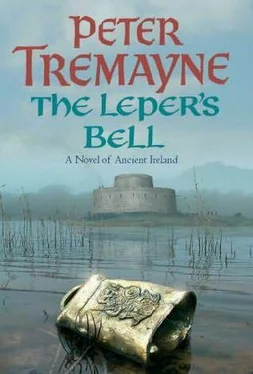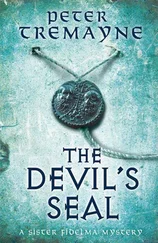Peter Tremayne - The Leper's bell
Здесь есть возможность читать онлайн «Peter Tremayne - The Leper's bell» весь текст электронной книги совершенно бесплатно (целиком полную версию без сокращений). В некоторых случаях можно слушать аудио, скачать через торрент в формате fb2 и присутствует краткое содержание. Жанр: Исторический детектив, на чешском языке. Описание произведения, (предисловие) а так же отзывы посетителей доступны на портале библиотеки ЛибКат.
- Название:The Leper's bell
- Автор:
- Жанр:
- Год:неизвестен
- ISBN:нет данных
- Рейтинг книги:4 / 5. Голосов: 1
-
Избранное:Добавить в избранное
- Отзывы:
-
Ваша оценка:
- 80
- 1
- 2
- 3
- 4
- 5
The Leper's bell: краткое содержание, описание и аннотация
Предлагаем к чтению аннотацию, описание, краткое содержание или предисловие (зависит от того, что написал сам автор книги «The Leper's bell»). Если вы не нашли необходимую информацию о книге — напишите в комментариях, мы постараемся отыскать её.
The Leper's bell — читать онлайн бесплатно полную книгу (весь текст) целиком
Ниже представлен текст книги, разбитый по страницам. Система сохранения места последней прочитанной страницы, позволяет с удобством читать онлайн бесплатно книгу «The Leper's bell», без необходимости каждый раз заново искать на чём Вы остановились. Поставьте закладку, и сможете в любой момент перейти на страницу, на которой закончили чтение.
Интервал:
Закладка:
Cuirgí was smiling triumphantly and ignored the question.
‘When do we depart from this place?’
‘What guarantees do we have, do I have, that your confederates will keep their word?’ demanded Fidelma.
‘The word of the Uí Fidgente is as good as that of an Eóghanacht!’ snapped the younger man, Cuan.
Fidelma snapped back: ‘Then the value of the word of the Uí Fidgente has changed since your prince, Eoganán, swore an oath of service to my brother and within the year led the Uí Fidgente in an attempt to topple him from the throne of Muman. I am not here to argue the relative worth of the words of the Uí Fidgente and the Eóghanacht. I am here to find out whether the promise of your followers is good or not. It is my baby that is the pawn in this game.’
Cuirgí sat back and gazed at her thoughtfully, and then he shrugged.
‘I have told you that we do not know these confederates. We did not have any knowledge of their plans. But it is good to hear that our defeat at Cnoc Áine has not utterly destroyed the manhood of the Uí Fidgente. If they have encompassed this means of having us released from the grey prison walls of Cashel, then my heart sings praises to them and I will say that whatever they do, I am for it.’
Fidelma’s eyes narrowed into glowing points of ice.
‘Very well. When you meet your deliverers, Cuirgí of Ciarraige, tell them this from me — they must keep their promise and Alchú must be delivered without harm into my arms. If they even contemplate not doing so, I swear, by all I hold holy, to hunt them down. Each one of them, each one’s son and each one’s son’s son, even to the last generation so not one of them shall have anyone to remember him.’
Her voice was quiet but so cold that her sincerity could not be questioned. Cuirgí was surprised by her vehemence.
‘A religieuse, issuing curses?’ He tried to put derision into his tone but failed.
‘It is not the religieuse but the mother who issues the curse,’ Fidelma replied softly. ‘And lest you be in doubt, I am acquainted with the ancient ways as well as the new. I will have no compunction, no reservation at all, at pronouncing the glam dicín?
Cuirgí’s jaw dropped suddenly.
‘But that is expressly forbidden by the New Faith.’
The three Uí Fidgente chieftains saw something in her eyes that caused an involuntary shiver to visit them.
‘There any many things the New Faith disapproves of, Cuirgí,’ she said softly. ‘Disapproval does not cause them to evaporate into thin air nor does it stop their use. For a thousand years and even a thousand years before that, our druids knew the power of the glam dicín and passed it on, and who are we religious but the druids in new guise?’
The glam dicín was a potent incantation directed against a particular person or persons — a curse which was feared to the extent that it could put the recipients under a sense of shame powerful enough to result in sickness and death and even prevent their rebirth in the Otherworld. Those under the glam dicín were rejected by their families and all levels of society, and were doomed to remain outcasts without hope in this world or the next unless the curse was lifted. It was a curse that was ancient, ancient before time began.
‘You could not do that,’ Cuirgí muttered but his voice was not confident.
‘You cannot know the pain of a mother whose child is threatened if you think I would refrain from any means to protect my baby,’ replied Fidelma quietly.
Cuirgí examined her for a moment and then shrugged.
‘When we meet our deliverers, I shall pass on your message.’
Fidelma stood up abruptly.
‘Then gather what things you need to take. The jailer will take you to the gates shortly and you will be escorted to the northern road and set upon it.’
She left the chamber before they could stand or respond.
The ferret-faced jailer let her out of the Duma na nGiall back into the main complex of the palace. She went straight to her chamber and poured a beaker of corma and swallowed it in one draught. She felt weak and angry with herself, for she had not meant to go so far as to threaten anything so serious as the glam dicín. If that threat came to the ears of even Bishop Ségdae, who was a fair-minded and progressive member of the Faith, she could be excommunicated. It was a serious matter. Yet the primitive anger that welled within her as she thought of her baby had got the better of Fidelma’s emotions. She could think of no other weapon to threaten the Uí Fidgente with.
She sat down on the bed and groaned aloud, holding her head in her hands.
‘Oh, Eadulf! Where are you when I need your calm strength?’ she whispered. She rocked to and fro on the edge of the bed for a few moments and then, with a sniff, she tried to draw himself together. What was he up to? Where had he gone?
She rose, hearing movement in the yard outside. Leaning from the window she looked down and saw horses being prepared. Colgú was even giving the chieftains mounts to allow them to make the journey back to their land at speed and in comfort.
She left her chamber and hurried along the corridor and down the stairs into the yard. She looked round for Gorman, who was to escort the Uí Fidgente chieftains. There seemed no sign of him but she spotted Caol leading a horse forward from the stables.
‘Where is Gorman?’ she asked curiously.
‘Gone,’ replied Caol laconically. It was clear that he was preparing his own mount for the escort of the chieftains.
‘I thought he was going to escort the Uí Fidgente and put them on the northern road?’
Caol shrugged. ‘All I know is that Gorman asked me to do this duty and said he had important matters that took him from Cashel.’
‘Important matters?’
‘He had his horse saddled.’
Caol mounted as the three Uí Fidgente were escorted forward. Fidelma hurried on to the gate where Finguine was waiting to watch the former hostages make their departure.
‘Do you know what mission has sent Gorman from Cashel?’ she asked without preamble.
Finguine looked at her blankly.
‘No mission of mine, cousin, that’s for sure. I thought he was escorting the chieftains.’
‘Caol has been asked to undertake that task. He and the chieftains are leaving any moment.’
‘Ah well, maybe it was some personal business that he had to deal with.’ Finguine turned to one of the guards at the gates. ‘Did Gorman tell you what business drew him from Cashel?’
The guard shook his head. ‘No, lord Finguine. He rode past me a short time ago but said nothing.’
Fidelma was frowning.
‘I don’t suppose you happened to see what direction he took?’ she asked on impulse.
‘I watched him go down the hill then turn through the township. He took the west road.’
Fidelma suddenly felt a chill sensation. So Gorman had turned west, west along the road that Eadulf had said he was taking; west to the abbey of Coimán.
Chapter Twelve
Eadulf had spent the night at a wayside inn a short way to the west of Cnoc Loinge. He had not really wanted to be beholden to the hospitality of Fiachrae the loquacious chieftain of the settlement and so he had skirted it and ridden on for a while. Aware of the oncoming dusk and a mist rolling down from the surrounding hills, he had started to wonder whether he had made the right decision when he saw the bobbing light in the distance, set by a crossroads. A moment later he had halted his horse under the lantern, which was swaying in the evening breeze whispering through the trees that towered on all sides. The sign said ‘Bruden Slige Mudán’.
Eadulf never ceased to admire the concept of hospitality expressed in the five kingdoms by the establishment everywhere of public hostels for free lodging and entertainment of all who chose to claim them. Each clan appointed a public hostel manager or innkeeper called a brugaid whose duty was to keep an open house for travellers. The brugaid was allotted a tract of land and other allowances to defray the expenses of the inn. His office was held in high regard. Most public hostellers were of the rank of bo-aire , magistrate, and were empowered to give judgement on certain cases brought before them. In local terms, each was able to hold court in his course for the election of a chieftain of his clan. At least one bruden was maintained in its territory by each clan.
Читать дальшеИнтервал:
Закладка:
Похожие книги на «The Leper's bell»
Представляем Вашему вниманию похожие книги на «The Leper's bell» списком для выбора. Мы отобрали схожую по названию и смыслу литературу в надежде предоставить читателям больше вариантов отыскать новые, интересные, ещё непрочитанные произведения.
Обсуждение, отзывы о книге «The Leper's bell» и просто собственные мнения читателей. Оставьте ваши комментарии, напишите, что Вы думаете о произведении, его смысле или главных героях. Укажите что конкретно понравилось, а что нет, и почему Вы так считаете.











